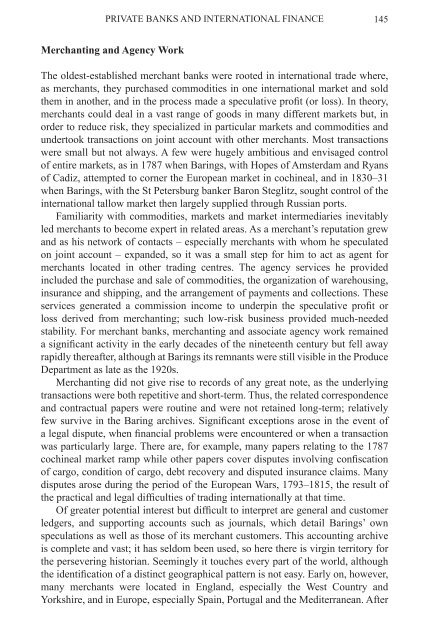the world of private banking
the world of private banking
the world of private banking
Create successful ePaper yourself
Turn your PDF publications into a flip-book with our unique Google optimized e-Paper software.
PRIVAtE BANKS AND INtERNAtIONAL FINANcE 145<br />
Merchanting and Agency Work<br />
The oldest-established merchant banks were rooted in international trade where,<br />
as merchants, <strong>the</strong>y purchased commodities in one international market and sold<br />
<strong>the</strong>m in ano<strong>the</strong>r, and in <strong>the</strong> process made a speculative pr<strong>of</strong>it (or loss). In <strong>the</strong>ory,<br />
merchants could deal in a vast range <strong>of</strong> goods in many different markets but, in<br />
order to reduce risk, <strong>the</strong>y specialized in particular markets and commodities and<br />
undertook transactions on joint account with o<strong>the</strong>r merchants. Most transactions<br />
were small but not always. A few were hugely ambitious and envisaged control<br />
<strong>of</strong> entire markets, as in 1787 when Barings, with Hopes <strong>of</strong> Amsterdam and Ryans<br />
<strong>of</strong> Cadiz, attempted to corner <strong>the</strong> European market in cochineal, and in 1830–31<br />
when Barings, with <strong>the</strong> St Petersburg banker Baron Steglitz, sought control <strong>of</strong> <strong>the</strong><br />
international tallow market <strong>the</strong>n largely supplied through Russian ports.<br />
Familiarity with commodities, markets and market intermediaries inevitably<br />
led merchants to become expert in related areas. As a merchant’s reputation grew<br />
and as his network <strong>of</strong> contacts – especially merchants with whom he speculated<br />
on joint account – expanded, so it was a small step for him to act as agent for<br />
merchants located in o<strong>the</strong>r trading centres. The agency services he provided<br />
included <strong>the</strong> purchase and sale <strong>of</strong> commodities, <strong>the</strong> organization <strong>of</strong> warehousing,<br />
insurance and shipping, and <strong>the</strong> arrangement <strong>of</strong> payments and collections. These<br />
services generated a commission income to underpin <strong>the</strong> speculative pr<strong>of</strong>it or<br />
loss derived from merchanting; such low-risk business provided much-needed<br />
stability. For merchant banks, merchanting and associate agency work remained<br />
a significant activity in <strong>the</strong> early decades <strong>of</strong> <strong>the</strong> nineteenth century but fell away<br />
rapidly <strong>the</strong>reafter, although at Barings its remnants were still visible in <strong>the</strong> Produce<br />
Department as late as <strong>the</strong> 1920s.<br />
Merchanting did not give rise to records <strong>of</strong> any great note, as <strong>the</strong> underlying<br />
transactions were both repetitive and short-term. Thus, <strong>the</strong> related correspondence<br />
and contractual papers were routine and were not retained long-term; relatively<br />
few survive in <strong>the</strong> Baring archives. Significant exceptions arose in <strong>the</strong> event <strong>of</strong><br />
a legal dispute, when financial problems were encountered or when a transaction<br />
was particularly large. There are, for example, many papers relating to <strong>the</strong> 1787<br />
cochineal market ramp while o<strong>the</strong>r papers cover disputes involving confiscation<br />
<strong>of</strong> cargo, condition <strong>of</strong> cargo, debt recovery and disputed insurance claims. Many<br />
disputes arose during <strong>the</strong> period <strong>of</strong> <strong>the</strong> European Wars, 1793–1815, <strong>the</strong> result <strong>of</strong><br />
<strong>the</strong> practical and legal difficulties <strong>of</strong> trading internationally at that time.<br />
Of greater potential interest but difficult to interpret are general and customer<br />
ledgers, and supporting accounts such as journals, which detail Barings’ own<br />
speculations as well as those <strong>of</strong> its merchant customers. This accounting archive<br />
is complete and vast; it has seldom been used, so here <strong>the</strong>re is virgin territory for<br />
<strong>the</strong> persevering historian. Seemingly it touches every part <strong>of</strong> <strong>the</strong> <strong>world</strong>, although<br />
<strong>the</strong> identification <strong>of</strong> a distinct geographical pattern is not easy. Early on, however,<br />
many merchants were located in England, especially <strong>the</strong> West Country and<br />
Yorkshire, and in Europe, especially Spain, Portugal and <strong>the</strong> Mediterranean. After












![[Pham_Sherisse]_Frommer's_Southeast_Asia(Book4You)](https://img.yumpu.com/38206466/1/166x260/pham-sherisse-frommers-southeast-asiabook4you.jpg?quality=85)



